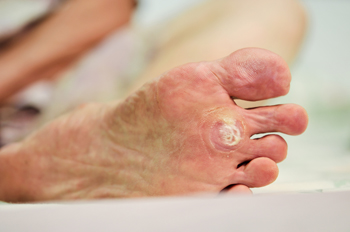
Plantar warts are benign growths that appear on the soles of the feet due to a viral infection caused by the human papillomavirus, or HPV. These warts often develop on weight-bearing areas, such as the heels or balls of the feet, that make walking uncomfortable. Symptoms typically include small, rough, and grainy lesions that may have tiny black dots within them. They can also cause pain or discomfort when standing or walking. Plantar warts spread through direct contact with the virus, which thrives in warm, moist environments, like swimming pools or communal showers. The virus enters the skin through small cuts or abrasions. Maintaining good foot hygiene and avoiding walking barefoot in public places can help reduce the risk of contracting and spreading plantar warts. If you have developed a plantar wart, it is suggested that you schedule an appointment with a podiatrist who can treat it accordingly.
Plantar warts can be very uncomfortable. If you need your feet checked, contact Robert Dunne, DPM from Lake Washington Foot and Ankle Center. Our doctor will assist you with all of your foot and ankle needs.
About Plantar Warts
Plantar warts are the result of HPV, or human papillomavirus, getting into open wounds on the feet. They are mostly found on the heels or balls of the feet.
While plantar warts are generally harmless, those experiencing excessive pain or those suffering from diabetes or a compromised immune system require immediate medical care. Plantar warts are easily diagnosed, usually through scraping off a bit of rough skin or by getting a biopsy.
Symptoms
- Lesions on the bottom of your feet, usually rough and grainy
- Hard or thick callused spots
- Wart seeds, which are small clotted blood vessels that look like little black spots
- Pain, discomfort, or tenderness of your feet when walking or standing
Treatment
- Freezing
- Electric tool removal
- Laser Treatment
- Topical Creams (prescription only)
- Over-the-counter medications
To help prevent developing plantar warts, avoid walking barefoot over abrasive surfaces that can cause cuts or wounds for HPV to get into. Avoiding direct contact with other warts, as well as not picking or rubbing existing warts, can help prevent the further spread of plantar warts. However, if you think you have developed plantar warts, speak to your podiatrist. He or she can diagnose the warts on your feet and recommend the appropriate treatment options.
If you have any questions please feel free to contact our offices located in Melbourne and Palm Bay, FL . We offer the newest diagnostic and treatment technologies for all your foot and ankle needs.
